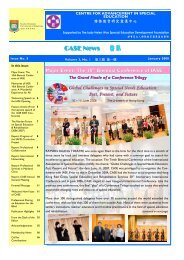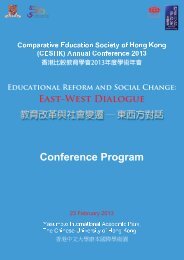C E R C u l a r - Faculty of Education - The University of Hong Kong
C E R C u l a r - Faculty of Education - The University of Hong Kong
C E R C u l a r - Faculty of Education - The University of Hong Kong
You also want an ePaper? Increase the reach of your titles
YUMPU automatically turns print PDFs into web optimized ePapers that Google loves.
CERCular<br />
Vol.10, No.2, 2004<br />
<strong>The</strong> Vietnam National Council on<br />
<strong>Education</strong> invited the CERC Director,<br />
Mark Mason, to contribute to their<br />
International Forum on Vietnam <strong>Education</strong>:<br />
Higher <strong>Education</strong> Reform. He<br />
presented a paper, Strategies and Solutions<br />
for Quality Higher <strong>Education</strong>:<br />
(1) Enhancing Learning Effectively,<br />
and (2) Initiating and Sustaining <strong>Education</strong>al<br />
Change, which was well received<br />
and stimulated considerable discussion<br />
at the forum. <strong>The</strong> forum was<br />
attended by the Deputy Prime Minister,<br />
the Minister <strong>of</strong> <strong>Education</strong> and Training,<br />
the Director General <strong>of</strong> the Vietnam National<br />
Council on <strong>Education</strong>, and other<br />
senior members <strong>of</strong> government, who<br />
participated actively throughout. <strong>The</strong><br />
CERC’s International Research Consultancies and Collaboration<br />
In 1999, UNESCO’s International Institute for <strong>Education</strong>al<br />
Planning (IIEP) published a book by Mark Bray<br />
entitled <strong>The</strong> Shadow <strong>Education</strong> System: Private Tutoring<br />
and its Implications for Planners. <strong>The</strong> metaphor <strong>of</strong> a shadow<br />
was used to describe private tutoring for several reasons:<br />
� private supplementary tutoring only exists because<br />
the mainstream education exists;<br />
� as the size and shape <strong>of</strong> the mainstream system<br />
change, so do the size and shape <strong>of</strong> supplementary<br />
tutoring; and<br />
� in almost all societies, much<br />
more public attention focuses<br />
on the mainstream than on its<br />
shadow.<br />
<strong>The</strong> book noted that large<br />
numbers <strong>of</strong> children receive supplementary<br />
tutoring, and that it has a<br />
particularly long history in East Asia.<br />
In <strong>Hong</strong> <strong>Kong</strong>, one survey found that<br />
45% <strong>of</strong> primary, 26% <strong>of</strong> lower secondary,<br />
and 41% <strong>of</strong> upper secondary<br />
students received tutoring. A study<br />
in Seoul, Korea, found that 82% <strong>of</strong><br />
primary and 66% <strong>of</strong> secondary school<br />
students were receiving tutoring. And<br />
in Japan, 70% <strong>of</strong> students have<br />
attended juku or received other forms<br />
<strong>of</strong> tutoring by the time they complete<br />
middle school. Tutoring in these<br />
societies consumes huge amounts <strong>of</strong><br />
money, and has major implications both for mainstream<br />
schooling and for social stratification.<br />
In 2004, Mark Bray was invited to join a project which<br />
builds on his work and takes it to a different part <strong>of</strong> the<br />
world. <strong>The</strong> project is funded by the Open Society Institute<br />
(Soros Foundation), and focuses on Eastern and Central<br />
Europe. Within this region is great diversity, which permits<br />
Shadow <strong>Education</strong> in<br />
Eastern and<br />
Central Europe<br />
Mark Bray and Git a Steiner-Khamsi<br />
in Tbilisi, Georgia<br />
19<br />
some fascinating comparisons. In addition, the region as a<br />
whole can be compared with East Asia and other parts <strong>of</strong><br />
the world to show the impact <strong>of</strong> cultural, economic and<br />
political influences.<br />
In July 2004, Mark travelled to Tbilisi, Georgia, for a<br />
workshop on this project. Georgia, which borders on<br />
Armenia, Azerbaijan and Russia, is one <strong>of</strong> the republics <strong>of</strong><br />
the former Soviet Union and has experienced major stresses<br />
in its education system. Teachers are very poorly paid, and<br />
have to undertake tutoring and<br />
other activities simply to survive.<br />
This situation is very different from<br />
that in <strong>Hong</strong> <strong>Kong</strong>, for example.<br />
<strong>The</strong> project is being undertaken<br />
by teams in Azerbaijan, Armenia,<br />
Croatia, Estonia, Georgia, Lithuania,<br />
Latvia and Poland. During the<br />
workshop, participants from each<br />
country focused on draft questionnaires<br />
and discussed methodological<br />
issues. <strong>The</strong>y are now proceeding<br />
to data collection, keeping in<br />
touch with each other and with Mark<br />
Bray through the Internet.<br />
“This is a really exciting project”<br />
Mark commented. “It takes<br />
the concepts set out in the 1999<br />
book as the starting point, and<br />
moves them to a completely different<br />
part <strong>of</strong> the world.” <strong>The</strong><br />
project, he added, “has great potential to make both conceptual<br />
and practical inputs”.<br />
An added pleasure for Mark during the Tbilisi workshop<br />
was to collaborate with Gita Steiner-Khamsi, who is<br />
one <strong>of</strong> CERC’s small number <strong>of</strong> Associate Members. Gita is<br />
based in Teachers College, Columbia (New York), and is<br />
also an adviser to the Open Society Institute on its education<br />
projects.<br />
Higher <strong>Education</strong> Reform in Vietnam<br />
invited “international experts” were also<br />
requested to consult as a group with<br />
these senior members <strong>of</strong> government in<br />
the evening after the first day <strong>of</strong> the<br />
conference. A key question with which<br />
Vietnam is grappling is how to open up<br />
the space in which its universities operate<br />
following years <strong>of</strong> highly centralised<br />
and autocratic decision-making in the<br />
tertiary domain. Mark Mason was interviewed<br />
by Vietnam’s national television<br />
and radio about how <strong>Hong</strong> <strong>Kong</strong><br />
protects, or at least endeavours to<br />
protect, the academic and political independence<br />
<strong>of</strong> its universities. It was, in<br />
sum, a valuable opportunity to raise the<br />
pr<strong>of</strong>ile <strong>of</strong> HKU, the <strong>Faculty</strong>, and CERC.

















